Entrepreneurs in Recovery WORKSHOPS
60 - 90 Minute Workshops to Help Individuals Discover their Inherent Ability to Increase Resilience, Harness Strengths, Amplify Appreciation and Create Purposeful Visions.
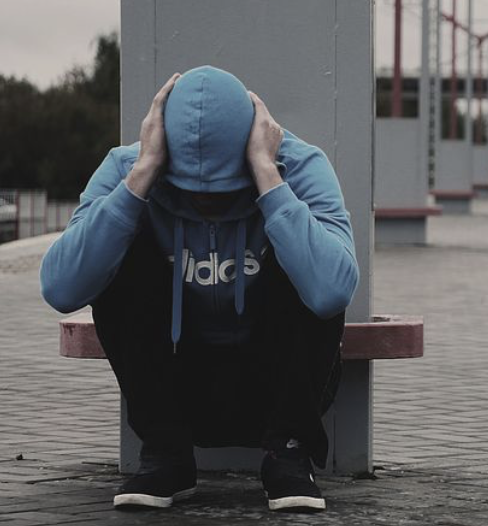
It's time to LISTEN to their stories.
To focus on their strengths.
To reveal their purpose.
To appreciate their contribution.
To show them why they matter.
To show them everything they need is within themselves. They are the entrepreneurs of their lives.

The mission of Entrepreneurs in Recovery® is to empower people struggling with addiction to move out of a cycle of destructive hopelessness and into their strengths to build healthy, purpose-driven habits.
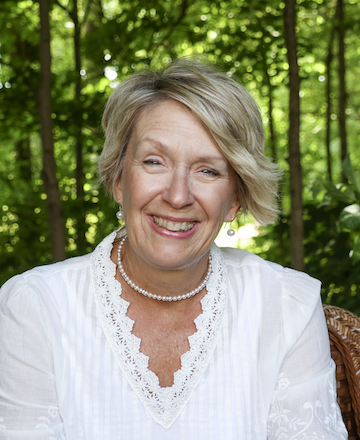
Hi, I'm Michelle, author, podcaster and the mother of a recovering addict .
Hi! I'm Michelle
It's my pleasure to facilitate these workshops for men and women in recovery,
Moms of addicted loved ones,
Businesses that need a new approach to employee wellness,
and others who want to recover from limited self-beliefs.
Showing people how to become their best self does not need to be an insurmountable obstacle.
All the tools and strategies they need to reach their full potential are hidden inside of them already.
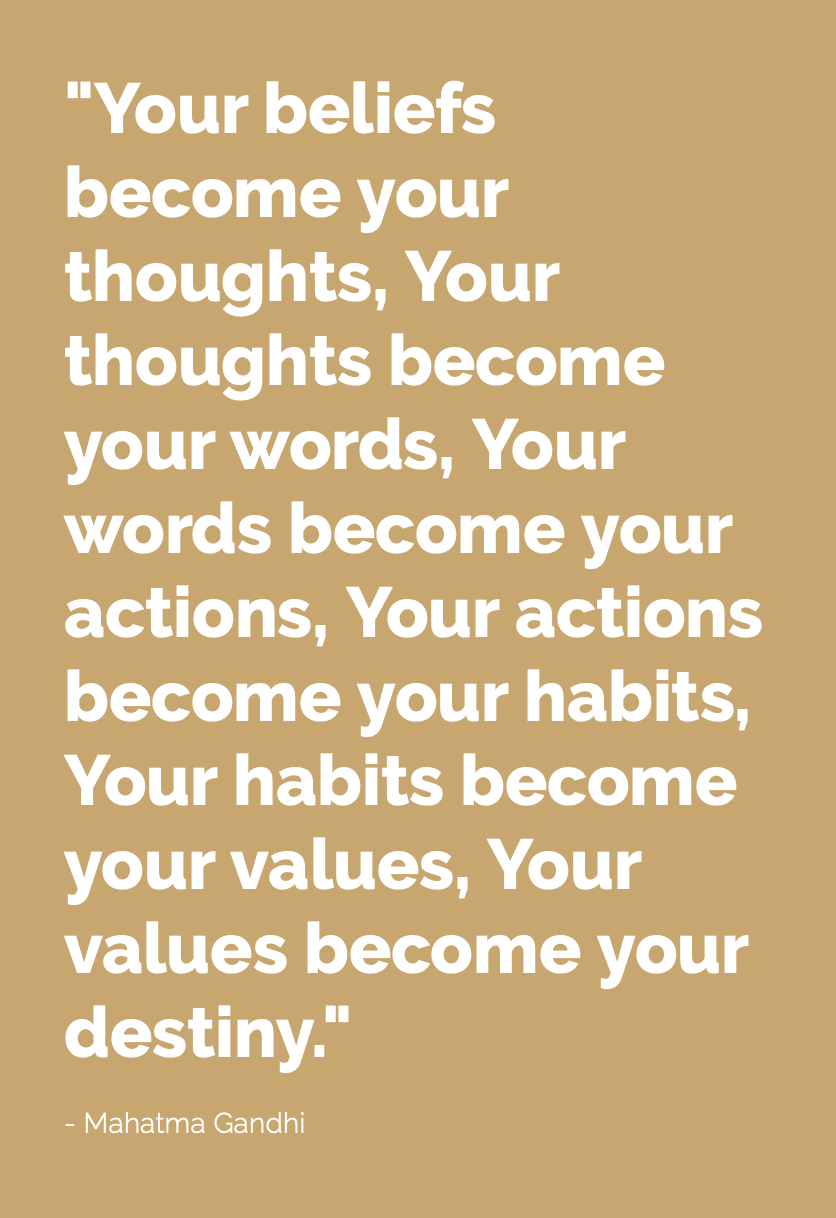
Over 150 People
Overdose
Every Day
Our addiction recovery system needs an upgrade. Our current success rates for people finding addiction treatment range from dismal to depressing.
In 2017, there were 70,237 drug overdose deaths in the United States – an increase of nearly 10% from 2016. (CDC)
Drug overdose-related deaths exceed both vehicle-related (44,000) and firearm-related (39,000) deaths annually. (Center on Addiction)
Nearly a quarter of young adults (21.2%) meet the criteria for an alcohol or illicit drug use disorder. (NIH)
93% of 18-25 year old’s who need treatment for substance misuse treatment did not get it. (USN)
Whether we are talking about alcohol, illegal substances or prescription medications, the numbers show that our current treatment models for substance use disorders are in desperate need of improvement.
These alarming numbers call for a shift in our treatment paradigm; a dynamic approach to facilitate addiction recovery and treatment. How might we create methods, programs, and approaches that facilitate long-term recovery outcomes?
In order to make a real difference in addiction recovery, this negative mindset must be changed.
Dr. Gabor Mate says, “Don’t ask, ‘What’s wrong with you? Ask, ‘What happened to you?’
How we treat people and talk to them is a matter of life and death in the world of addiction recovery.
These are important individuals who have a life purpose.
The traditional treatment model for substance use disorders leans toward the negative, seeing the client as broken and flawed; telling them they need to be fixed. Often, facilitators and counselors focus on what is not working, what’s missing, what’s broken, what is wrong or negative in an effort to fix the problem.
This old paradigm of thinking and doing often unleashes a client’s sense of shame which can be both toxic and destructive.
Deficit-based approach to recovery:
Addiction treatment as we know it now has a gap
Clients face the stigma of being “broken” and the need to “fix” them
Focus is placed on what is wrong instead of what is right or working
Clients are defined by their weaknesses rather than their strengths
Past failures are emphasized instead of strengths and future successes
Feelings of shame are often reinforced
The Old Way versus The New Approach
The Old Paradigm for Addiction Recovery
The New Paradigm for Addiction Recovery
The Truth in Industry Expense!
Only 1 in 5 or 20% of HR professionals say their company OPENLY and PROACTIVELY deals with employee addiction issues. But they pay $19.5 B in REACTIVE costs.
- Workplace Drug Testing $8.5B
- Workplace Wellness Programs 7.0B (No addiction content)
- Employee Assistance Programs/EAP 4.0 B
- Impaired Professional Programs $ ??
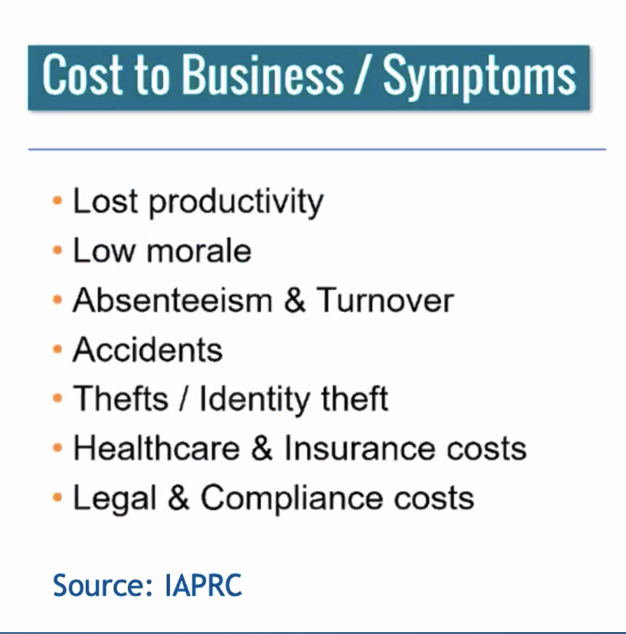
Honoring Diversity and Inclusion.
Our stories matter. The stories we create around our past failures and successes have the power to connect us, the power to destroy us, or the power to lift us up and find the resilience to keep us alive.
This is what Entrepreneurs in Recovery®workshops are all about. Participants learn to tap into their own resources and solutions within while gaining new perspectives and knowledge from others.
“Connection is the energy that is created between people when they feel seen, heard, and valued, when they can give and receive without judgement.” – Brené Brown
Entrepreneurs in Recovery® workshops help fill the gap. There is power in bringing the best out of people through conversations, appreciative thinking and creating new options for better living. Despite all that is happening in a person’s life, something is working.
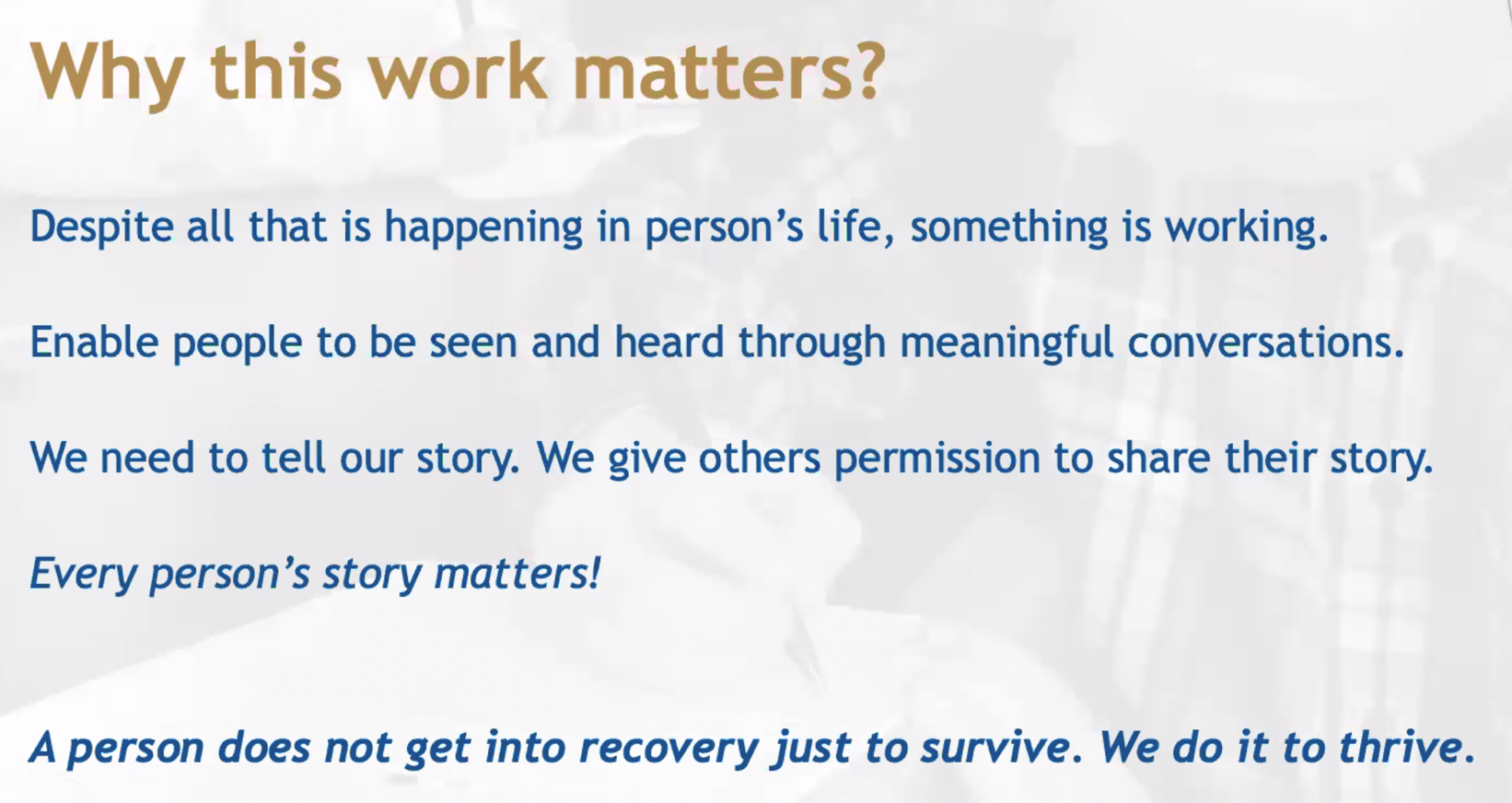
In these workshops, participants will discover a step-by-step, science-based approach to learning
life-skills and coping tools.
Five Entrepreneurs in Recovery Workshops
Discover a new strengths approach to empower people in addiction recovery for both individuals and groups.
Appreciate
Resilience
Elevate
Focus
Self-care
Resilience
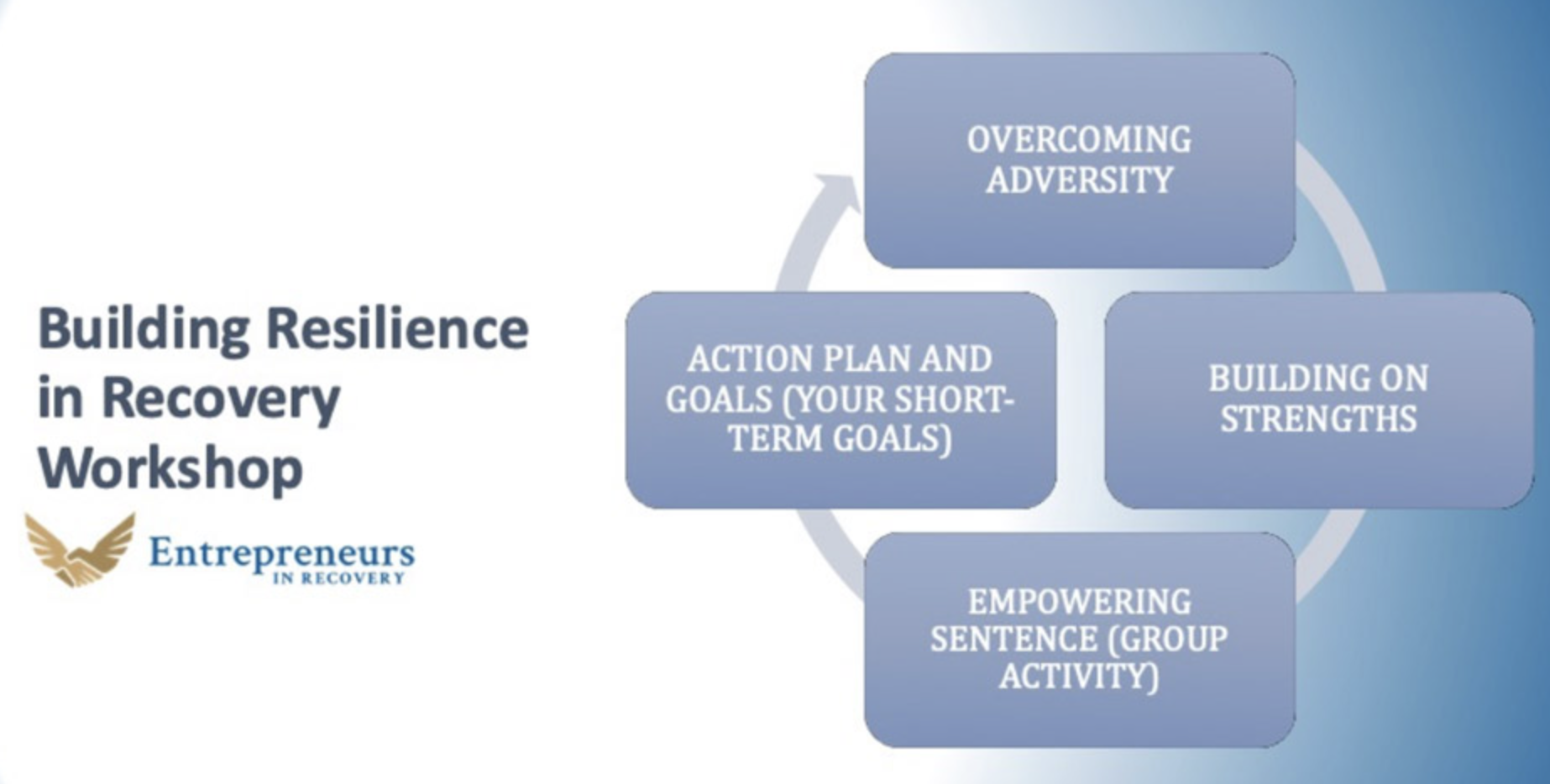
Examples of empowering sentences during workshops.
“What I can’t do alone, we can do together.”
“No matter how many times we fall, we get back up.”
“We are motivated, persistent, determined, and courageous about our recovery.”
“We as a team embody a lot of the same which gives us a fighting chance at a new life.”
“We are proud and courageous determined to take care of ourselves and our sobriety.”
“We resilient women are committed to evolving with creative and loving instincts to overcome addiction with kindness and empathy to transform chaos into serenity.
Focus
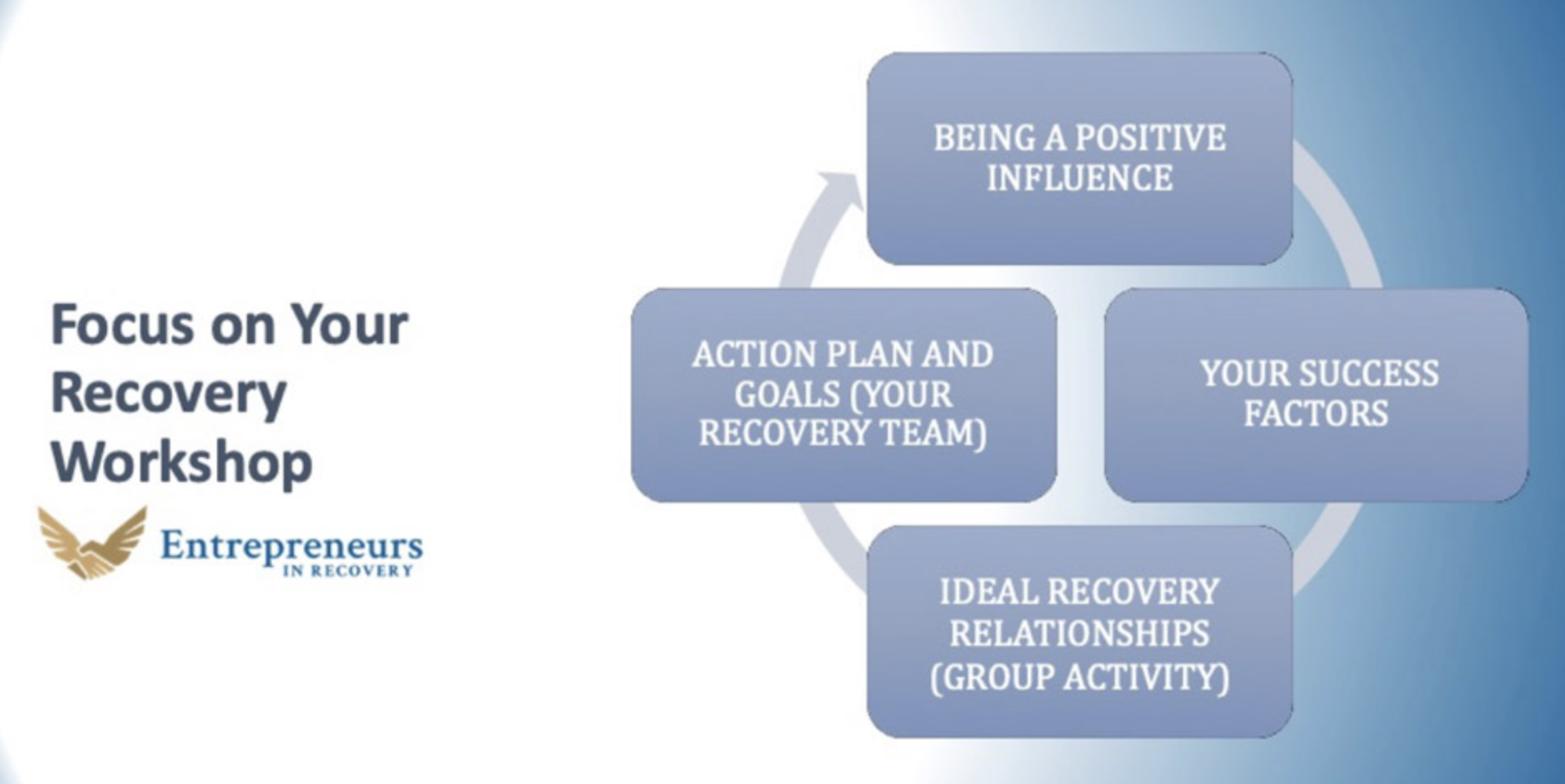
Focus On Your Recovery
We focus on times when you were a positive influence in the lives of others and tap into individual success factors. Next is a group activity to co-shape and design your ideal recovery relationship followed by the creation of your recovery team.
“Whatever you focus on expands.”
Elevate
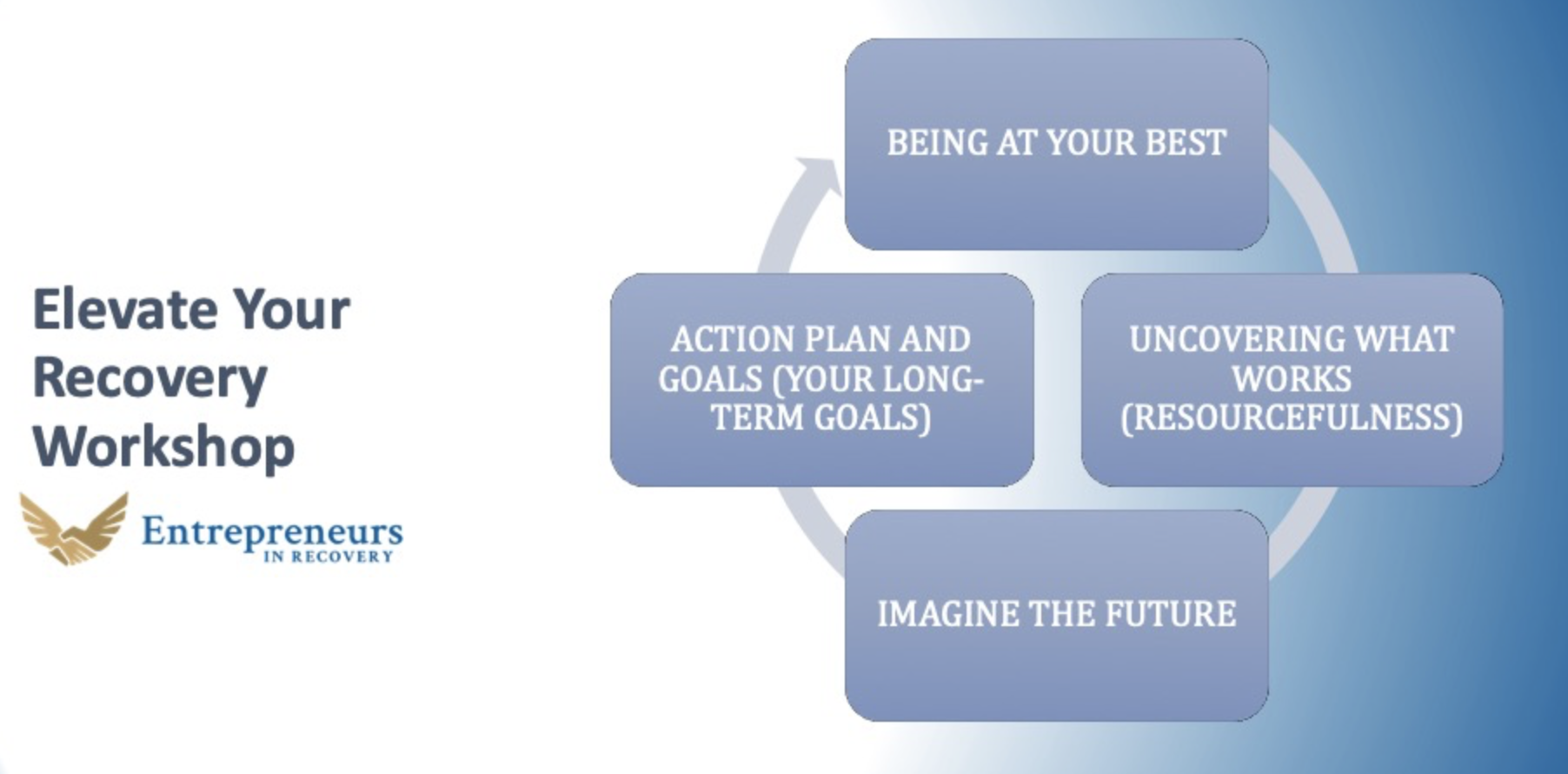
Elevate Your Recovery
We study moments of excellence and tap into the collective resourcefulness of the group. Next is a guided visualization of the future followed by the creation of a personal action plan to bring these images to life.
“We don’t get into recovery to survive, we do it to thrive.”
Appreciate
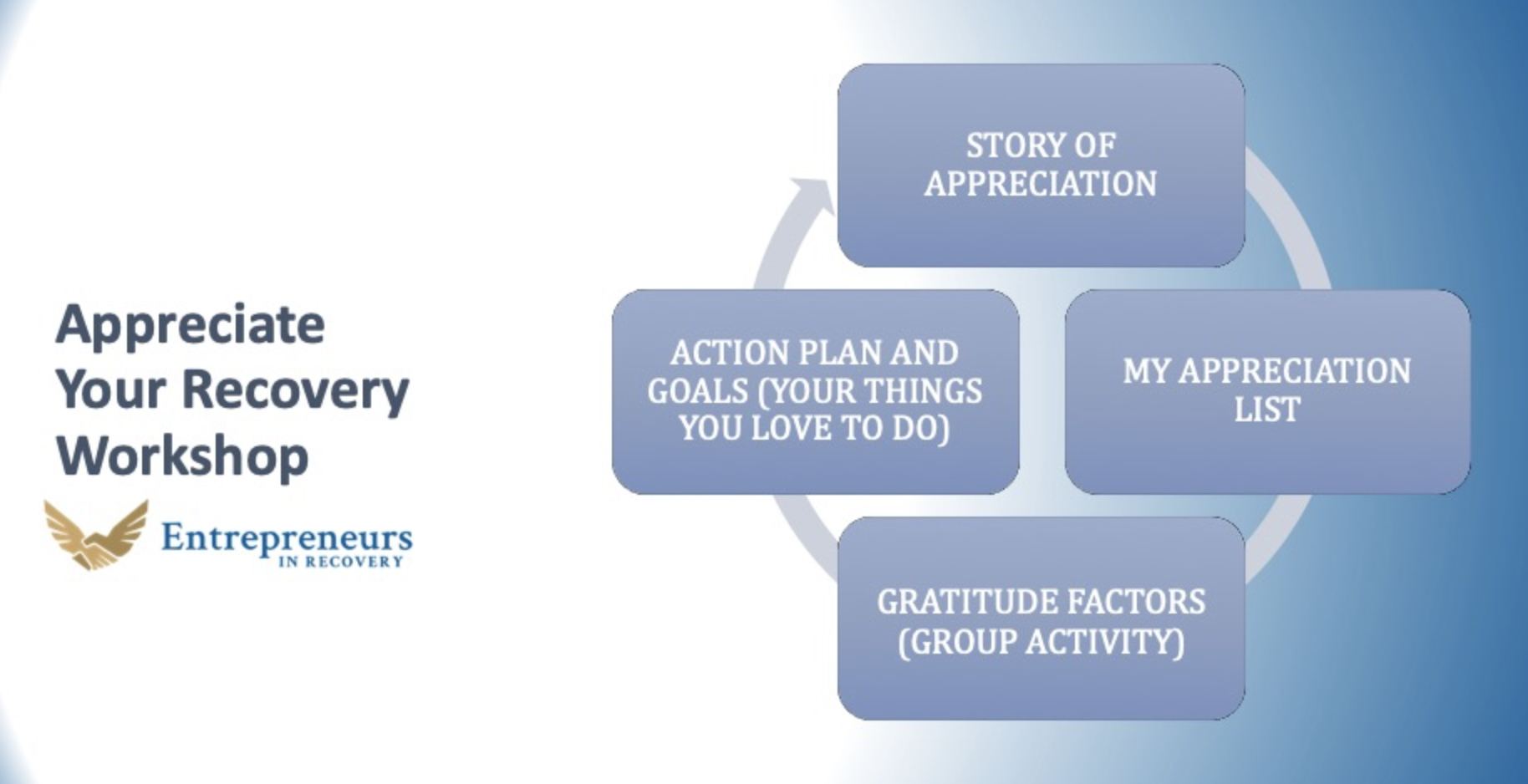
Appreciate Your Recovery
We focus on moments of appreciation followed by journaling actions you appreciate and love doing. Next is a group activity were participants co-create a skit or magazine cover regarding activities they love to do. Participants are then invited to create an action plan and list things they love and enjoy doing.
“Recovery is a continuous process that never ends.”
Self-Care
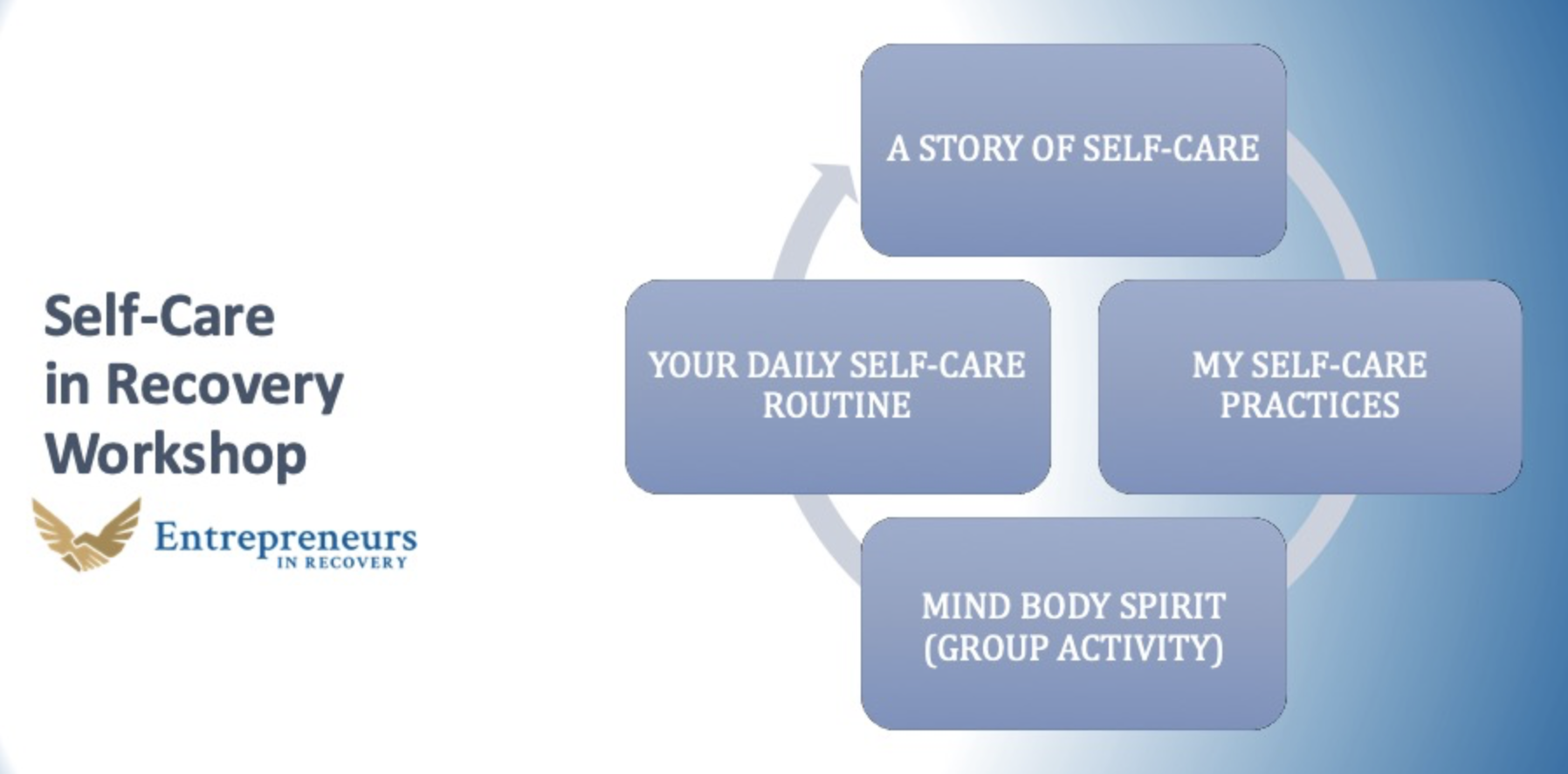
Self-Care in Recovery
We study moments of health and wellness followed by self-care actions and goals relating to the mind, body, and spirit. Next, we divide into groups to ideate an ideal self-care routine for recovery. This activity is followed by each participant creating their own daily self-care routine.
“Self-care is not selfish.”
How are our Workshops Different?
What makes our Workshops effective?
Strengths-Based (Transformation) approach:
We need to step into the person who is in front of us and meet people where they are at. We possess many of the resources we need within us, i.e. personal strengths, wisdom, and best practices.
What we focus on expands. If we focus on what has worked, such as a person’s strengths and stories of resilience and excellence, we draw out more of these positive qualities and behaviors. Having appreciative conversations around a person’s story, purpose, connection, strengths, vision and goals is what makes people come alive. These conversations are uplifting and energizing. They stimulate positive actions and people feel heard and acknowledged. Instead of looking for what’s wrong and what needs to be fixed, we look at what’s right and what’s working.
During Entrepreneurs in Recovery™ workshops, participants get to hear from diverse and different perspectives, learn new information from each other, and focus on what might be possible for the future.
Our Workshops are Experiential
We use the Appreciative Inquiry Approach
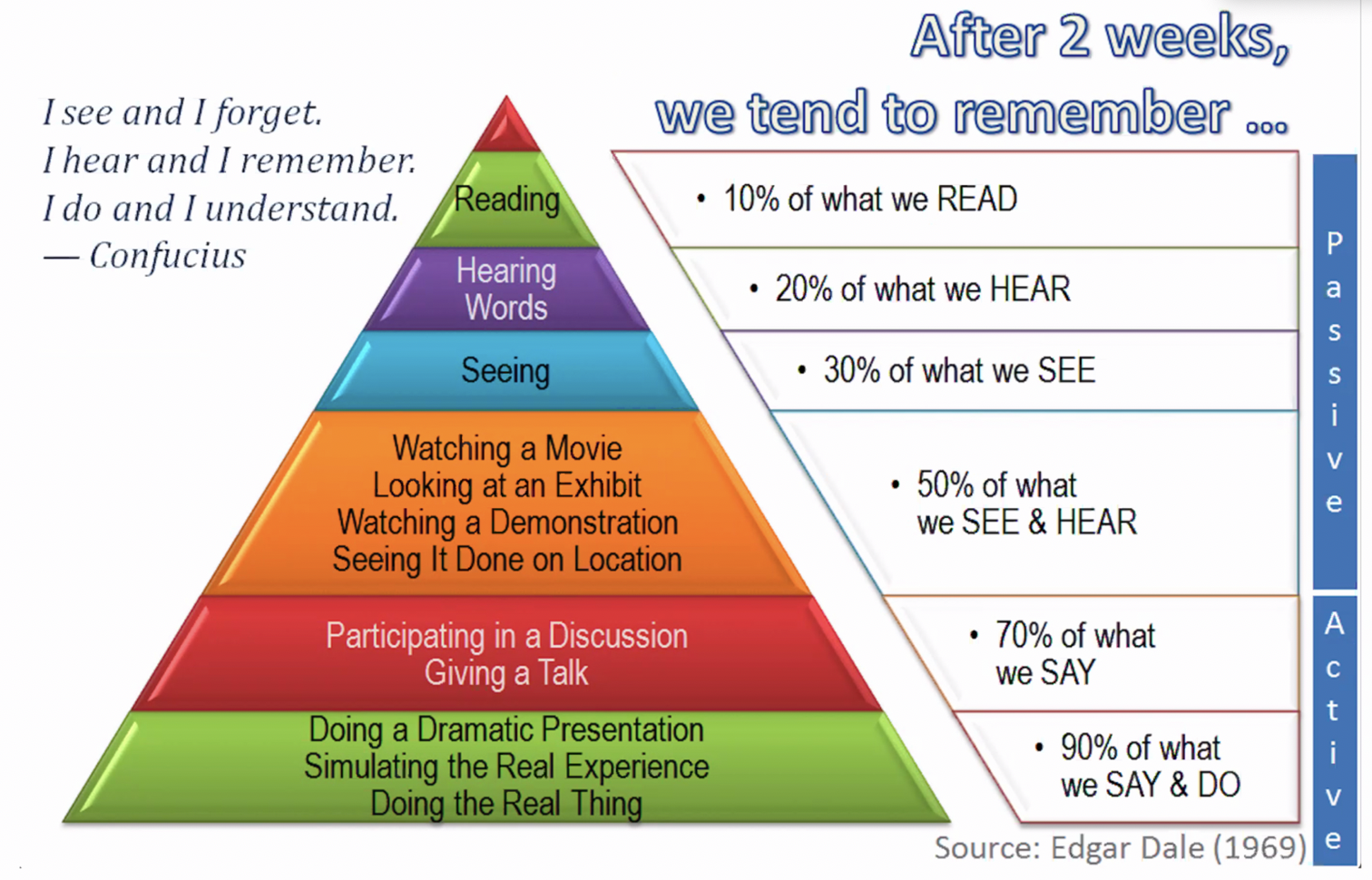
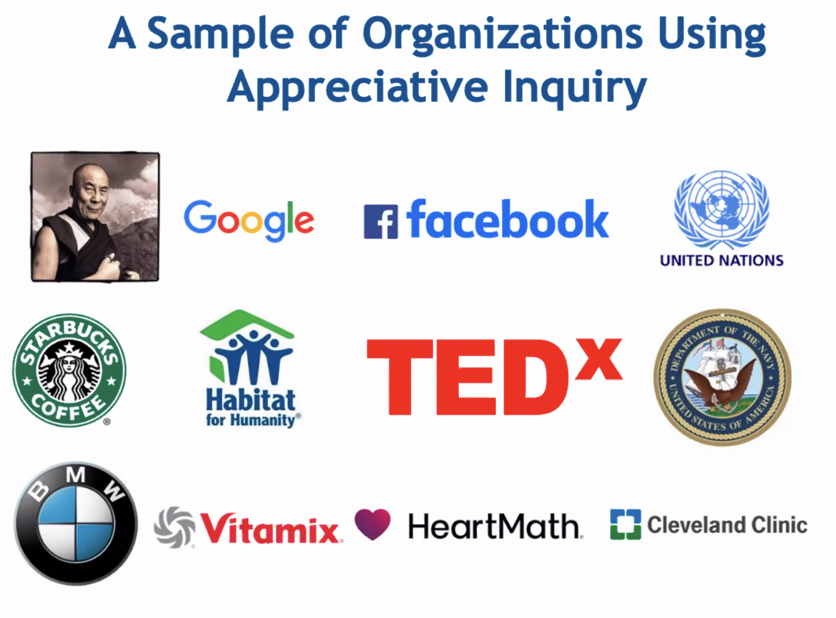
Who are our WORKSHOPS For?
- 1Life and Recovery Coaches
- 2Executives
- 3Healthcare Professionals
- 4Workplaces
- 5Moms of Addicted Loved Ones
- 6Addiction Treatment Centers
- 7Structured Sober Living
- 8Lead Facilitators
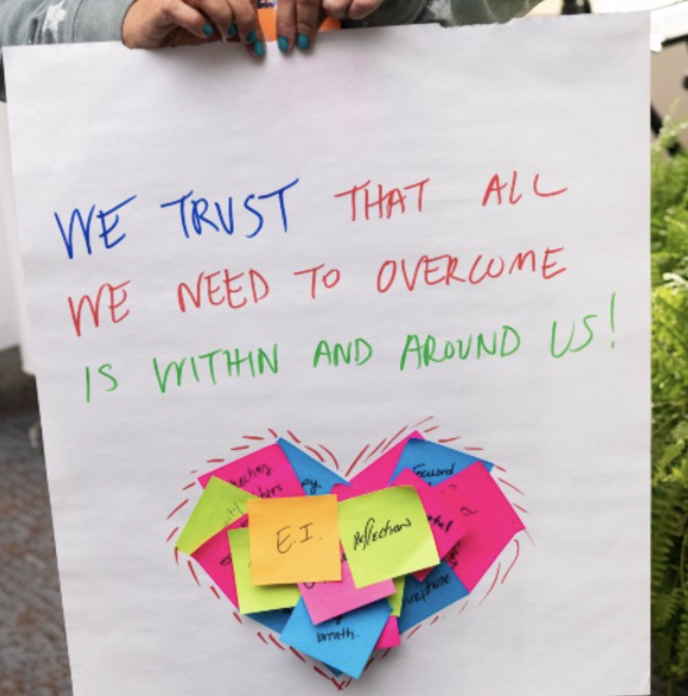
What Do Participants Think?
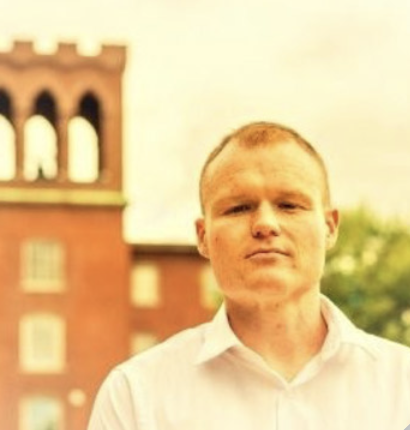
"Positive Long Term Outcomes ... "
"To see the number of folks participating. Their openness, their willingness to share, those are all huge things. A lot of guys generally don’t open up. And to open up that quickly to someone coming in that they don’t know was phenomenal.
This would absolutely benefit people in recovery whether they have six minutes, six days or six months of sobriety. This (workshop) would be beneficial to them in terms of positive long term outcomes.”
Andrew West
- Executive Director of Bonfire Recovery Ser
“We have positive qualities..."
“It’s encouraging and hopeful looking back to a point in our lives that was good. It helps me realize some of the positive qualities we have that we might have forgotten through our use. Helps to build goals to create the future we want.”
Samantha Allen
“Goals are possible!"
“The workshop shows the commonalities between different people to show us that we all want very similar futures. Goals are great and possible to accomplish.”

“Thank you for being a guiding light ..."
“Thank you for being a guiding light for all those around you and for creating opportunities for individuals like myself to create impact in deep, meaningful ways. Through your training and guidance, doors have opened up for me in ways I never thought possible. We truly are changing lives.”
Sentences created by participants during Stephanie’s first Entrepreneurs in Recovery® workshop:
“We are courageously connecting to a spirit within us that leads us to acceptance and confidence."
“We resilient women are committed to evolving with creative and loving instincts to overcome addiction with kindness and empathy to transform chaos into serenity."
Stephanie Courtillier
- Founder of Integrous Women
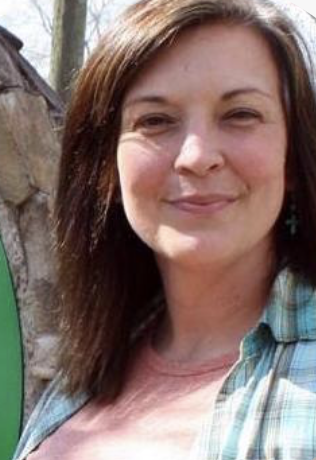
“They tap into each of our personal and unique skill sets ..."
“Trainings are boring. Same messages from different people, regurgitating statistics and facts from years long ago. Trainings can be the black cloud of necessity to keep our certifications or licensure‘s valid.
The trainings through Entrepreneurs of Recovery workshops are designed to tap into each one of our personal and unique skill sets to fan a flame of fire that brought us to our work in the beginning."
Claudia Hamilton
- Executive Director of Living Proof Recovery and Next Door
Michelle Weidenbenner
Author of Moms Letting Go Without Giving Up
My Greatest Fear ...
... used to be that our son would die of an overdose.
Every time I heard an ambulance siren, I feared it was for our son. I lived with a racing heart and found anxiety and frustration with the way society dealt with the stigma of addiction. I didn't want to enable our son. I wanted to help him get well, and I didn't now how. I didn't know where to find help.
Finally, together, by blessings, he found a way. Now he is celebrating one year sober.
Today, my mission is to change the addiction recovery world--for all whom are affected--one conversation at a time. This work equips people with the skills not only to survive, but to thrive.
I work with individuals, groups, recovery training companies, communities, addiction treatment centers, and sober living homes because I’m passionate about seeing people get a great start in their recovery journey.
It's Time to Let Addicted Loved Ones
Tell Their Stories and Feel Safe
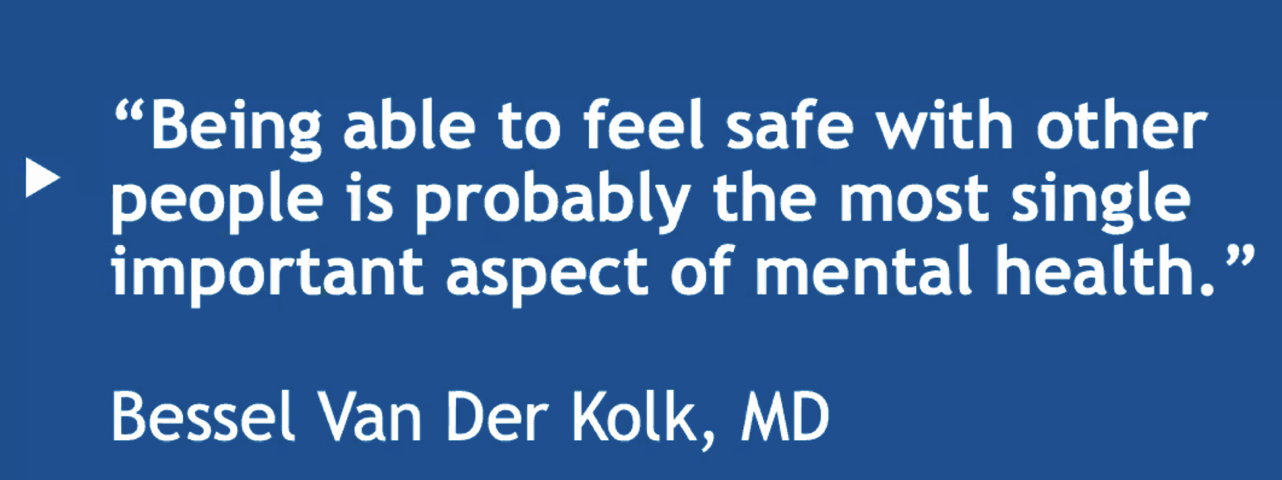
Only about ten-percent of people who suffer from substance use disorder seek treatment support. Starting the journey to recovery the right way is critical.
Addiction takes the lives of many people we love. How do we help people get a better start to their recovery journey?
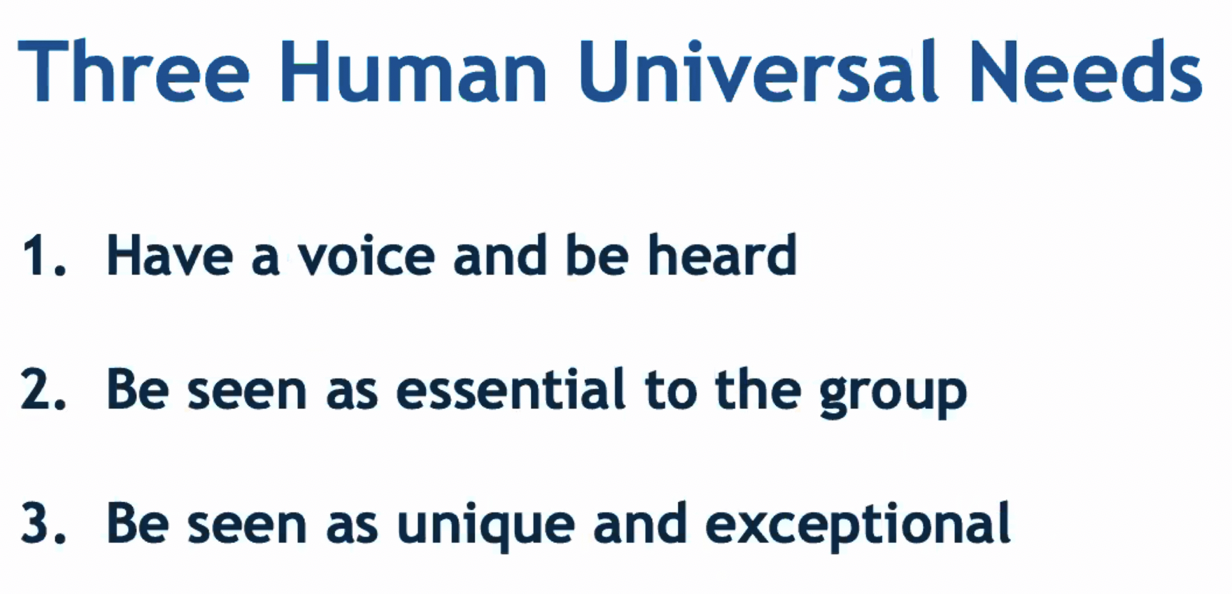
Here's What We Do
SAMHSA (Substance Abuse and Mental Health Services Administration)
Definition of Recovery:
“Recovery is a process of change through which individuals improve their health and wellness, live a self-directed life, and strive to reach their full potential.”
~ SAMHSA
How is this definition of recovery being demonstrated today?
Johann Hari states, “The opposite of addiction is not sobriety, the opposite of addiction is connection.”
A big trigger for relapse is isolation.
During Entrepreneurs in Recovery®workshops, we are beating isolation by creating deeper connections with peers and the people around us – it all starts with purposeful connecting and meaningful conversations.
Frequently Asked Questions
What do the workshops cost?
How can I reach you to discuss options?
Where are you located?
Do you facilitate these workshops for ONLY people in addiction recovery?
Have you seen a change in those who have gone through your workshops?
Copyright - Michelle WeidenbennerMichelle@MichelleWeidenbenner.com